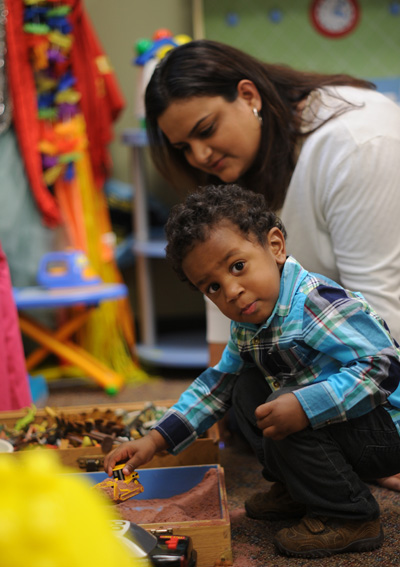
University of Mississippi graduate student Shilpa Golikere observes a child at play at the CAPTI office on the Oxford campus. UM Photo by Nathan Latil.
OXFORD, Miss. – For many therapists, a room packed with toys provides an ideal environment to identify sources of stress and emotional trauma in children. That fact has not been lost on the counselors at the Child Advocacy and Play Therapy Institute at the University of Mississippi.
In response to a growing need for registered play therapists, CAPTI, part of the UM School of Education, is offering a one-of-a-kind online Specialist in Education degree with an emphasis in play therapy, a form of psychotherapy involving play to better communicate with and help clients. CAPTI is approved as a center for play therapy education by the Association for Play Therapy, known as APT.
“We’ve had an interest in our program coming in from therapists as far away as Ireland, Portugal and India,” said Marilyn Snow, CAPTI director and associate professor of counselor education. “What’s interesting about this program is you can complete it almost anywhere.”
The program is accepting applications with a fall admission deadline of August 1. The innovative, 18-credit curriculum is the first degree program to require 335 hours of supervised play therapy practicum, an experience necessary to qualify mental health professionals for the Registered Play Therapist credential from the APT.
“As the state’s flagship university, this is another way we’re preparing students to help transform the lives of others,” Chancellor Dan Jones said.
The program’s online format makes it ideal for working therapists. All students will be required to complete a three-day residency at the institute, where they will undergo face-to-face supervision and intensive work in CAPTI playrooms.
“There are online certificate programs in play therapy, but this is the first online degree program in play therapy offered in the United States that provides the experience to become a registered play therapist,” Snow said.
GRE scores are not required for admission. However, applicants must hold an approved master’s degree or higher in a mental health field, such as counseling, psychology, clinical social work or marriage and family, and have one year of experience and at least 1,000 hours of supervised, post-master’s clinical experience.
An active state or individual license in a mental health field – such as licensed professional counselor, licensed school counselor, licensed psychologist, licensed marriage and family therapist or licensed clinical social worker – is also necessary for the program.
Once accepted, students must have access to a facility that can offer 10 hours of play therapy experiences per week and be able to record sessions with clients beginning in the program’s second semester to complete the 335 required hours of play therapy practicum. Applicants also will be asked to provide proof of professional liability insurance.
Coursework will cover the theoretical foundations of play therapy, applications in schools and mental health services, psychopharmacology, ethics, law and more.
“Dr. Snow is a national leader in play therapy,” said David Rock, dean of the Ole Miss School of Education. “Creating a safe and active environment where children can act out what they’re feeling instead of verbally communicating it is fascinating and important. The degree is one of the more exciting programs we offer.”
The institute, which became the 18th university-sponsored center to gain APT approval last September, has offered play therapy services and expert witness consultation since October and is scheduled to move to a larger facility in Insight Park in the fall, allowing the institute to expand from two to four play rooms.
Besides its education mission, the institute provides play therapy services for north Mississippi and operates with a payment system based on income to offer pro bono services.
“We don’t turn children away because they can’t pay,” Snow said. “Everything we do – the education, the consultation and the therapy – is to find a way to help more children who need it.”
For more information on CAPTI, go to http://education.olemiss.edu/capti/.